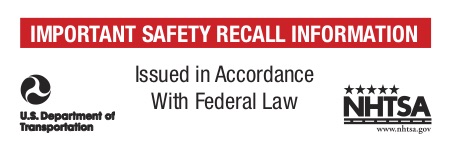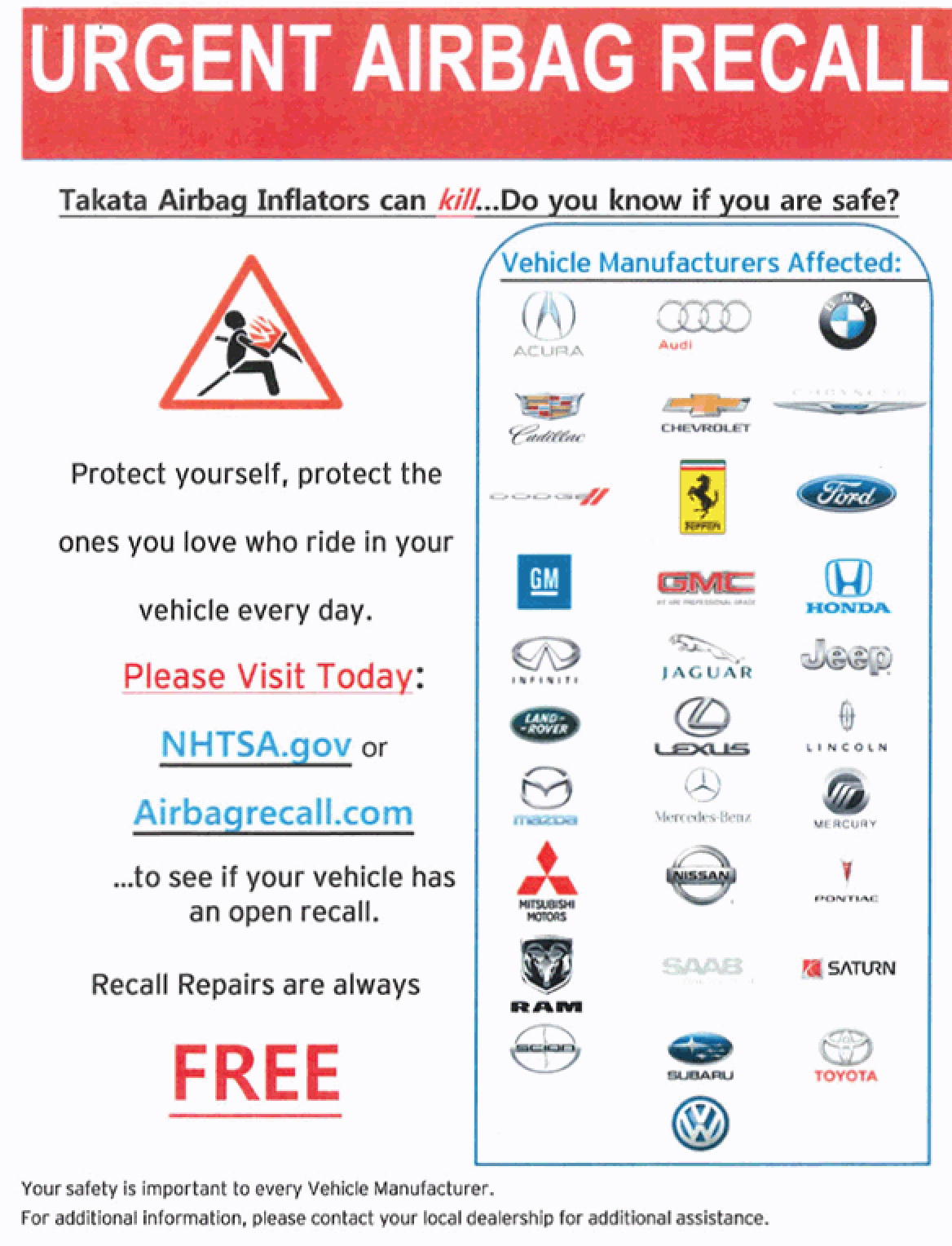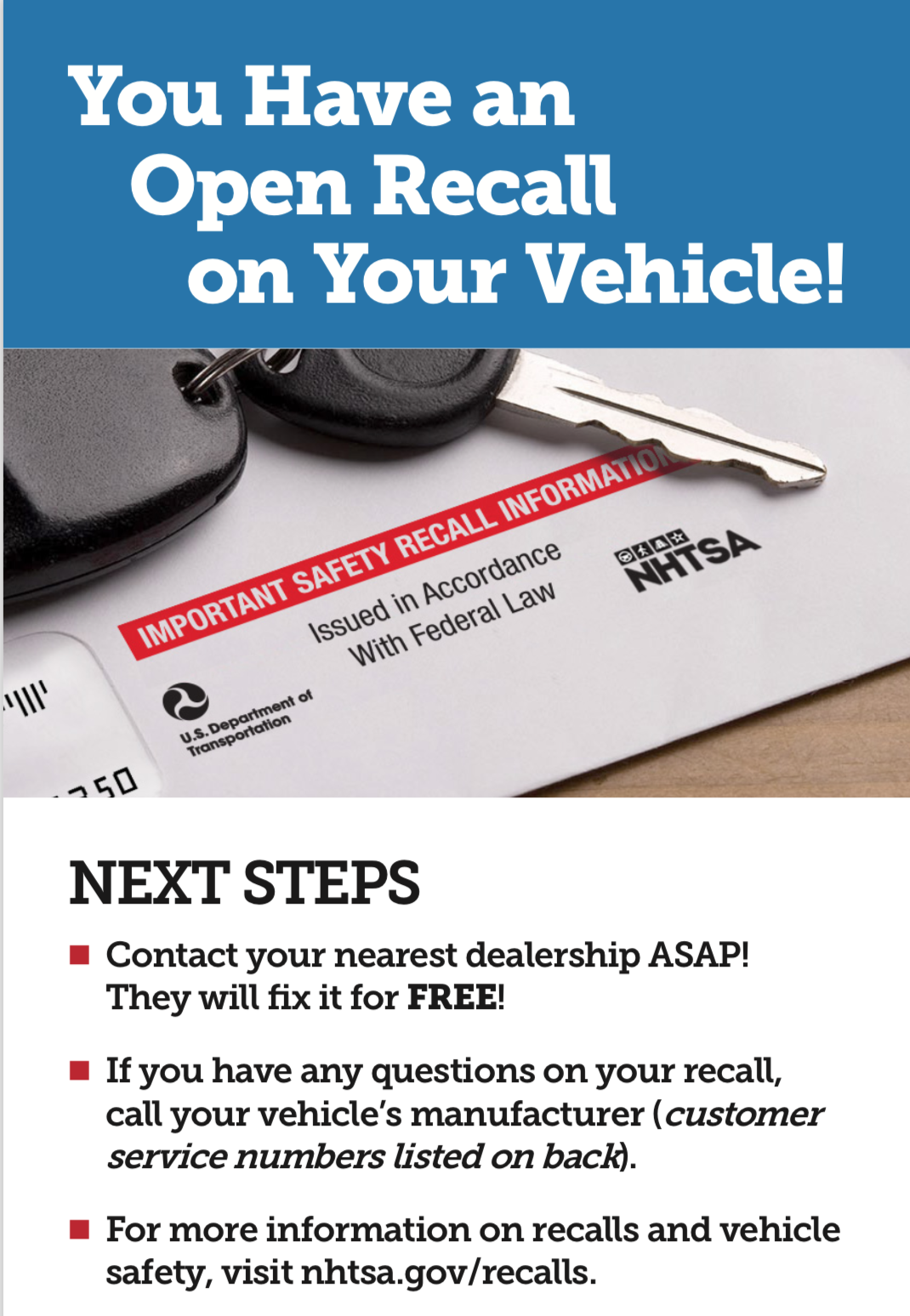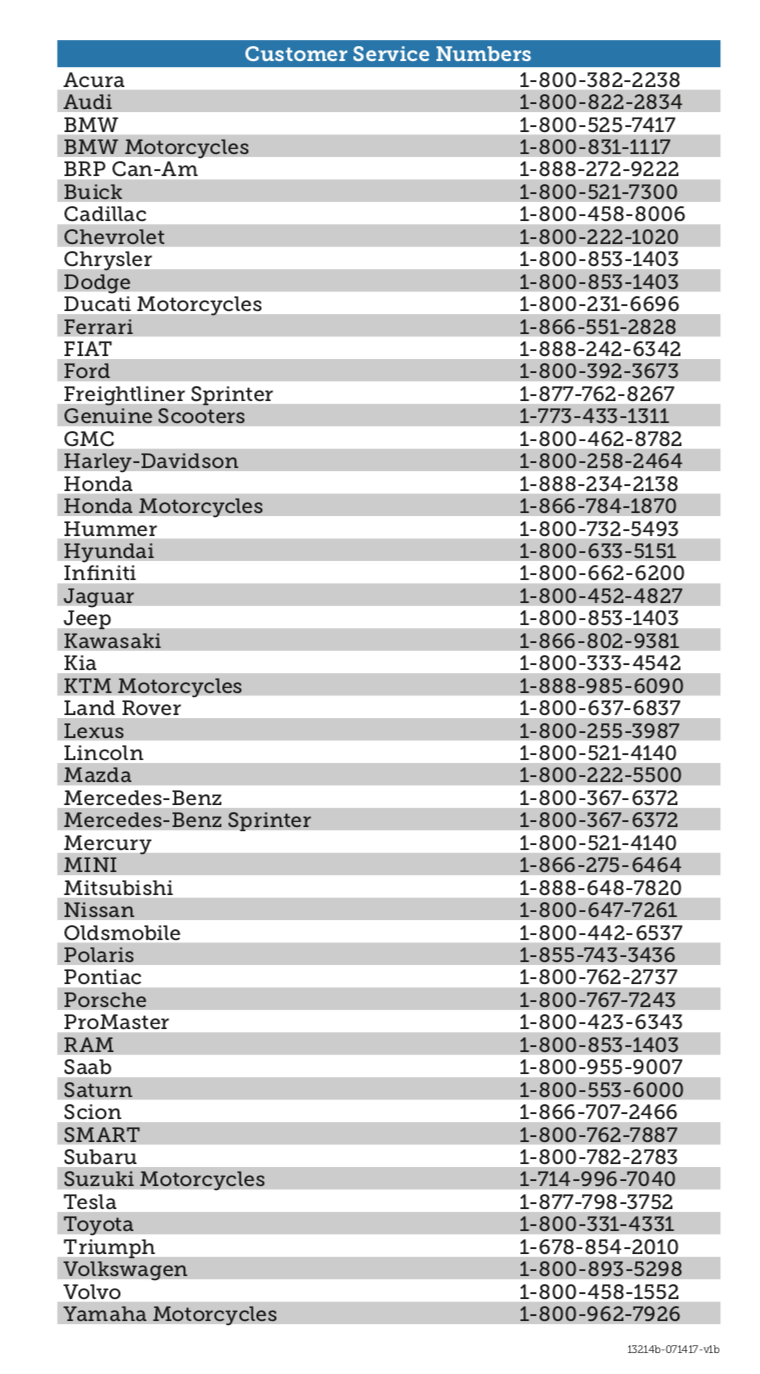Form NHTSA Form 1501 NHTSA Form 1501 ODI Recall Communications OBB Discussion Guide
Generic Clearance for the Collection of Qualitative Feedback on Agency Service Delivery
ODI Recall Communications OBB Discussion Guide_DRAFT_2019-05-10
Collection of Qualitative Feedback on Effective Recall Communications for Office of Defects Investigation Recall Campaign Promotion.
OMB: 2127-0682
Discussion Guide OMB Control No. 2127-0682
Recall – Consumer Education Expiration Date 8/31/2021
N HTSA
ODI Recall Communications Bulletin Board Research
HTSA
ODI Recall Communications Bulletin Board Research
Discussion Guide
DRAFT May 9, 2019
Dates:
Wave
1 – DATES TBD Board
1 (Gen Pop) Board
4 (Owns vehicle impacted by Takata recall)
Wave
2 – DATES TBD
Board
2 (Gen Pop) Board
3 (Hispanics) Board
5 (Owns vehicle impacted by Takata recall) Note:
All boards will receive the same activities
INTRODUCTION
Thank you for taking this online discussion. Your opinions are important to us! Please be honest when answering questions and providing feedback as part of this online discussion. Your answers are anonymous and confidential, and none of your individual information will be shared with any third parties.
[INCLUDE ON ITS OWN SEPARATE SCREEN AFTER THE INTRODUCTION SCREEN] This collection of information is voluntary and will be used for formative purposes only so that we may develop communications programs designed to reduce the number of traffic-related injuries and deaths. A federal agency may not conduct or sponsor, and a person is not required to respond to, nor shall a person be subject to a penalty for failure to comply with a collection of information subject to the requirements of the Paperwork Reduction Act unless that collection of information displays a current valid OMB Control Number. The OMB Control Number for this information collection is 2127-0682. Public reporting for this collection of information is estimated to be approximately 60 minutes per response, including the time for reviewing instructions, completing and reviewing the collection of information. All responses to this collection of information are voluntary. Send comments regarding this burden estimate or any other aspect of this collection of information, including suggestions for reducing this burden to: Information Collection Clearance Officer, National Highway Traffic Safety Administration, 1200 New Jersey Ave, S.E., Washington, DC, 20590
Welcome to day 1 of our Online Discussion Forum! My name is [INSERT MODERATOR NAME] and I’ll be the moderator for our discussion over the next several days. I’m glad you could join us and I’m looking forward to our discussions.
As a reminder, you have agreed to participate in a three (3) day research project. It is very important for you to log into the forum on each of the following dates in order to collect your incentive at the end of the project:
Wave 1 boards
|
Wave 2 boards
|
There are about 40 participants in this group and each of you is identified by a unique screen name.
There are a few important things to note about this forum:
It’s secure.
It’s comprised of participants like yourself who were pre-screened to join by invitation only.
It’s being held for market research purposes only, not related to sales or sales efforts whatsoever.
None of your personally identifiable information will be revealed.
We believe you will find this engaging and that through collaboration with peers you can interact and inform one another. Be as detailed and expressive as you can.
Because of the nature of the topic matter in this discussion and that this is for research purposes, we ask that you keep all content to yourself rather than discussing it with people outside of the forum.
How It Works
Our discussion topics will cover a number of elements related to your perspectives on and experiences with vehicle recalls. This includes how you gather information about recalls and what actions, if any, you take as a result.
The Online Forum works as follows: for each of the 3 days this week, I will post some questions at roughly the same time every day, and then during the rest of the day and night I will read everyone's responses and occasionally respond with my own follow-up questions.
Please be sure to log on multiple times throughout each day—the first time to give your initial response to the posted questions and then later to see what others have said and make follow-up comments or respond to additional posted questions.
Your detailed and candid feedback and insight on all 3 days will be invaluable. Throughout the discussion you will be able to view, react and build on the ideas of others—it is important for you to do so. Sometimes, however, topics may be private so that no one is influenced by the responses or ideas of others.
Ready, Set, Go!
To summarize what you need to do:
Log on daily. Read and respond to the questions for the day in as much detail as you can.
Log on again, a few hours later. Read what others have said and respond to any follow-up questions I may have posted and add more comments as appropriate.
If you have downloaded the mobile app to your smart phone or tablet, you can answer directly from there any time of the day or night.
Be respectful of your fellow participants. Be open and honest in expressing your thoughts and feelings with respect.
Log on early. Participate each day as early as you can to give time for the other participants and me to share in what you have said.
OK, let’s get started by clicking on the first activity under Day 1!
Day 1: Perceptions of and Experiences with Recalls
Our conversation over the next few days is going to focus on automotive vehicles, specifically looking at perceptions of and experiences with recalls. Before we dive into that discussion, we’d like to know a bit about the vehicles you currently own.
Please tell me how many vehicles you currently own and write down the year/make/model for each one.
Here is an example of how I’d like to see your entry:
I own 2 vehicles:
2004 Subaru Impreza WRX
2018 Jeep Grand Cherokee
Next, I’d like you to rate how well a few statements relating to your vehicle(s) describe you.
Please rate how well the following statements describe you:
I do everything I can to keep up with the basic maintenance on my vehicle(s).
Does not describe me well at all
Describes me somewhat well
Describes me very well
Describes me extremely well
Describes me perfectly
I do everything I can to keep my vehicle(s) safe to operate.
Does not describe me well at all
Describes me somewhat well
Describes me very well
Describes me extremely well
Describes me perfectly
I do everything I can to pay attention to recalls and take my vehicle(s) in for repair if I receive a recall notice.
Does not describe me well at all
Describes me somewhat well
Describes me very well
Describes me extremely well
Describes me perfectly
Now let’s focus on recalls. Are you aware of any open recalls (those that have not been repaired) for your vehicle(s)?
No
Yes
1.4 Think for a moment about this phrase “Motor Vehicle Safety Defects and Recalls.” What thoughts and feelings come to mind when you read/hear that phrase? Please be as specific as you can in your description.
1.5 If you wanted to find out if your vehicle had a recall, how would you go about finding out if your vehicle had a recall?
1.6 Still thinking about information related to Motor Vehicle Safety Defects and Recalls, people can receive information from different sources. There are laws requiring manufacturers to contact owners to alert them about recalls on the vehicles they own. The U.S. Department of Transportation, National Highway Traffic Safety administration also makes efforts to build awareness around recalls more broadly. I’d like to know your thoughts on those two sources and answer two questions below (and tell me a bit about your answers).
First, is it important to receive information from both sources? If so, why?
Second, is one more important than another? If so, please explain.
1.7 Let’s assume there was a recall on your vehicle. What would be the MOST effective way to notify you of the recall to make sure you receive the message and that it gets your attention?
1.8 How would you like to receive the information about the recall? What format would you most prefer (mail, phone call, email, text)?
1.9 Still assuming there was a recall on your vehicle, I’d like to know what the MOST effective way would be to talk to you about the recall and how to get it fixed. What information would be the most important to know? Please describe at least 2-3 three types of information that would be important to know.
1.10 Still assuming there was a recall on your vehicle, what would motivate you to schedule a repair? Are there specific words or phrases that would encourage you to schedule a repair sooner rather than later?
1.11 Some people believe that some vehicle recalls are more important to fix than others. How about you? Do you feel some vehicle recalls are more important to repair than others? Or is every recall equally important to repair?
1.12 Is it important for the recall notification to communicate how critical it is to have the repair made as soon as possible? If so, please explain the best way to communicate that.
1.13 Can you tell me some examples of the types of things that come to mind when you think of vehicle recalls that are more important than others and would need to be repaired as soon as possible?
1.14 A number of vehicle recalls go unrepaired. Tell me some of the reasons why you would not take your car to the dealership to repair a recall. And thinking of those reasons, what can be done to overcome those barriers?
PROBE: IF THEY ARE RELIANT ON ONE VEHICLE
How difficult is it to leave the car for a repair?
Would having access to a free loaner or free cab ride make a difference?
Have you seen, read, or heard about mobile repairs? [IF YES PROBE: What do you know about them? Would you consider a mobile repair?]
1.15 Some people feel that the distance to the vehicle dealership is an inconvenience to having a vehicle recall repaired. Of course, this perception can depend on how close or far someone lives from a dealership.
First, I’d like to know when distance (in miles), would become a major barrier to having a recall repaired. How far would you feel would be too far you to drive to have a repair done on a series recall? And how far do you currently live from a dealer where you could have a recalled vehicle repaired?
Second, I’d like to know from a communications perspective, what would you need to know about a recall on your vehicle that would motivate you to take it in for a recall repair, even of the distance was a significant inconvenience for you?
1.16 What are your expectations regarding the amount of time it would take to complete a recall repair? In other words, how much time do you think it should take to complete a repair once you drop your vehicle off at the dealership?
1.17 At what point does the amount of time needed to make a vehicle repair serve as a barrier to having the repair made? And what are some examples of things that could be done to help overcome that barrier?
1.18 Next, I’d like to know about your own personal experiences with vehicle recalls. Have you ever had a recall for a vehicle? (Write in Yes or No below). If yes – in a couple of sentences, please tell me about the process, including if you had the repair made and what made you decide to make the repair.
If you had a vehicle recall and had it repaired, please write in – REPAIRED RECALL – and tell me about the process and what made you decide to have the repair made.
If you had a vehicle recall and did not have it repaired, please write in – DID NOT REPAIR – and tell me the reasons why you decided not to have the repair made.
If you did not have a vehicle recall, please write in – DID NOT HAVE A RECALL – and go on to the next question.
1.19 If you have had a vehicle recall in the past, how did you find out about the recall and what did you do next? If you have NOT had a recall in the past, how WOULD you expect to find out about the recall and what WOULD you do next?
1.20 If you have had a vehicle recall in the past, are there things that you feel could have been improved about the process of informing you about your vehicle recall?
If you have NOT had a recall in the past, please write in “I have not had a recall in the past” and go on to the next question.
End of Day 1 Topics
Thanks! That’s all for today. I am very appreciative of the time you spent answering these questions. New questions will be posted tomorrow.
Until then, be sure to come back later today to review responses from other participants and share your thoughts about their answers. Please indicate why you agree with some responses and why do you disagree with others by commenting on the posts.
Also answer any follow-up questions I might have for you before tomorrow’s activities.
One more thing…I have a favor to ask. Although you may be curious about automotive recalls, please don’t do any research (online or looking through your personal documents) at this time. Tomorrow we will want to get some additional feedback on this topic, and it is important that it is based on your current experiences and what you already know. We don’t want to bias or influence your responses for tomorrow’s exercises.
Thanks again, [INSERT MODERATOR NAME]
Day 2 Reactions to Recall Communication
Welcome Back!
Welcome back, and thank you again for your time.
Today we will be continuing our discussion around vehicle recalls and sharing some examples of different types of communications relating to vehicle(s) and/or recalls in general. Today’s activities are designed to understand your reactions to those communications. Let’s begin!
2.1 There are different ways vehicle owners can learn about recalls. One way is through letters they receive in the mail directly from vehicle manufacturers. What are some ways that manufacturers could make the envelopes used to send these letters better stand out (and make you more likely to open them)? [PROBE ON LABELING]
2.2 Now thinking about the letter itself, what are some ways to better communicate the importance of the issue and increase the likelihood to have the repair made?
As you answer please consider and share your thoughts on the following questions.
Are there specific types of information that need to be included?
What are some examples of words or phrases that would motivate you to schedule a repair sooner rather than later?
Are there any visuals that would influence your decision? If so, what would be more effective, pictures, photographs or illustrations?
2.3 Now let’s take a look at an example of a vehicle recall label. For our activity today imagine that this label was on a letter sent to you about a vehicle you own. Please take a moment and review the example below.
BLINDED NHTSA RECALL LABEL
SEE APPENDIX A

What are your impressions of this label?
If you received a letter in the mail with a label like this, what is the first thing you would do?
2.4 Looking over the label, what elements – including specific words and visual elements – are most effective in getting your attention?
2.5 Looking over the label, what elements – including specific words and phrases – are most influential on your decision to open and read the letter?
2.6 What would you do to change the label and make it more effective in getting people to open and read the letter?
2.7 Now let’s take a look at a second example of a recall label. Once again imagine this label was on a letter sent to you about one of your vehicles.
Please take a moment and review the example below.
NHTSA RECALL LABEL
SEE APPENDIX B

What are your impressions of this label?
If you received a letter in the mail with a label like this, what is the first thing you would do?
2.8 Looking over the label, what elements – including specific words and visual elements – are most effective in getting your attention?
2.9 Looking over the label, what elements – including specific words and visual elements – are most influential on your decision to open and read the letter?
2.10 What would you do to change the label and make it more effective in getting people to open and read the letter?
2.11 How does the inclusion of both the U.S. Department of Transportation and National Highway Traffic Safety Administration logos impact how you view the label? If you saw those logos on a label on a letter addressed to you, would you be more likely to open that letter? If so, why?
2.12 While law requires vehicle manufacturers to contact owners directly by mail to inform them of a recall, a second way to communicate with consumers about recalls is through articles and press releases. These could be featured in the news or in various media publications. Tell me a little bit about how this form of communication compares to the letters mailed to an individual owner.
What are some of the advantages of the articles and press releases?
What are some of the limitations?
Do you have a preference on where/how you would want to receive information about recalls?
2.13 Now let’s take a look at an example of a communication that could be used in an article, press release or posted online. Please take a moment and review the example below.
GENERAL RECALL FLYER
SEE APPENDIX C

What are your impressions of that communication?
If you saw a communication like this, what is the first thing you would do?
Where would you expect to see a communication like this?
2.14 Looking over the communication, what elements – including specific words and phrases – are most effective in getting your attention?
2.15 Looking over the communication, what elements – including specific words and phrases – are most influential on your decision to schedule a repair?
2.16 Are there any words or phrases that are unclear or confusing? Is there any information that should be added?
2.17 What would you do to change the communication and make it more effective in getting people to have their recalls repaired?
END OF DAY 2 TOPICS
That’s all for today. Our final set of activities will be posted tomorrow.
We have a short homework assignment to help prepare for tomorrow’s activities. Please make sure to have your VIN (vehicle identification number) for each vehicle you own accessible for tomorrow’s activities.
You can locate your VIN several ways. Most VIN plates appear on the lower left-hand side of the dashboard. Sit in the driver’s seat and look on the dashboard in front of the steering wheel. Alternately, you might be able to see the VIN easier by standing outside the vehicle and looking through the windshield.
You can also find your VIN on paperwork related to the vehicle (insurance card, title, registration, etc.).
Tomorrow you will need your VIN(s) for an activity using the U.S. Department of Transportation, National Highway Traffic Safety Administration’s NHTSA.gov website.
Thanks again for your thoughtful responses!
[INSERT MODERATOR NAME]
Day 3 NHTSA.gov – Searching for Recalls by VIN
Welcome Back!
Hello, welcome to our third day with our final set of activities. We really appreciate the thoughtful responses and discussion you all have been having over the last couple days. Today we are going to look at one more communication and then have you visit a website and look up some information about your vehicle(s) using your VIN(s).
3.1 To start let’s take a look at an example of a communication that could come from an organization dedicated to keeping people safe on America’s roadways. Please take a moment and review the example below.
NHTSA RECALL COMMUNICATION
SEE APPENDIX D
Front
|
Back
|
What are your impressions of that communication?
If you saw a communication like this, what is the first thing you would do?
Where would you expect to see a communication like this?
3.2 Looking over the communication, what elements – including specific words and phrases – are most effective in getting your attention?
3.3 Looking over the communication, what elements – including specific words and phrases – are most influential on your decision to schedule a repair?
3.4 Are there any words or phrases that are unclear or confusing? Is there any information that should be added?
3.5 What would you do to change the communication and make it more effective in getting people to have their recalls repaired?
3.6 Next, we want you to visit the U.S. Department of Transportation, National Highway Traffic Safety Administration’s NHTSA.gov website: www.NHTSA.gov/recalls
Have you previously heard of or used this site?
Yes – previously used
Yes – previously heard of/but haven’t used
No
3.7 Did you know there was a site like this?
Yes
No
3.8 In a few sentences please describe your overall impression of the U.S. Department of Transportation, National Highway Traffic Safety Administration’s NHTSA.gov website: www.NHTSA.gov/recalls
3.9 Now please go back to www.NHTSA.gov/recalls. The website allows you to search for recalls using your VIN(s). You may have more than one vehicle, and if so, we’d like you to look up each one.
Please look up your VIN(s) and tell us a little bit about what you learn.
Did you find any open recalls for your vehicle(s)? (write in Yes or No)
If so, which vehicle (write in year/make/model)?
If so, describe the recall.
Were you previously aware of that recall?
Here is an example of how I’d like to see your entry:
Yes I found a recall
2004 Subaru Impreza WRX
Corrosion issue relating to front lower control arm
Yes I was previously aware of the recall
3.10 If you found a recall that you were previously aware of, but haven’t scheduled a repair, why haven’t you had the repair made?
If this question doesn’t apply to you, please type in NOT APPLICABLE and move on to the next question.
3.11 If you found a recall that you were NOT previously aware of, please describe in a few sentences how you feel after finding out that you have a recall.
If this question doesn’t apply to you, please type in NOT APPLICABLE and move on to the next question.
3.12 If you found a recall that you were NOT previously aware of, vehicle manufacturers are required to send letters to owners of vehicles affected by recalls. Do you have any idea why it is that you didn’t know about it? We want to know in order to find ways to help better inform owners, so your ideas/thoughts are important here.
If this question doesn’t apply to you, please type in NOT APPLICABLE and move on to the next question.
3.13 Still thinking of www.NHTSA.gov/recalls, what would you change or add to the site to make it a better experience for users?
3.14 Still thinking of www.NHTSA.gov/recalls, what is the most effective way to communicate with owners about the site?
3.15 Still thinking of www.NHTSA.gov/recalls, what types of information is most useful to be communicated? How should it be communicated on the site?
3.16 Still thinking of www.NHTSA.gov/recalls, what organizations would be most effective to partner with to help promote the site and increase awareness among owners such as yourself?
3.17 Now thinking back over the discussion from the past week, based on everything you have seen, read and thought about, what is the most effective way to communicate with consumers about recalls?
3.18 Is there anything else you’d like to share, regarding vehicle recalls and how best to communicate with consumers about them?
END OF DAY 3 TOPICS
This brings us to the end of our session. Thank you so much for your thorough participation these past few days.
Please plan to check back a couple more times today to answer any follow up questions I might have for you and to read what others have posted. You can also comment on each other’s posts by clicking on the reply button under the post.
Thanks again for your engagement and thoughtful answers to my questions!
[INSERT MODERATOR NAME]
| File Type | application/vnd.openxmlformats-officedocument.wordprocessingml.document |
| File Title | Headline Placement Here |
| Author | Benjamin Custer |
| File Modified | 0000-00-00 |
| File Created | 2021-01-15 |
© 2026 OMB.report | Privacy Policy

